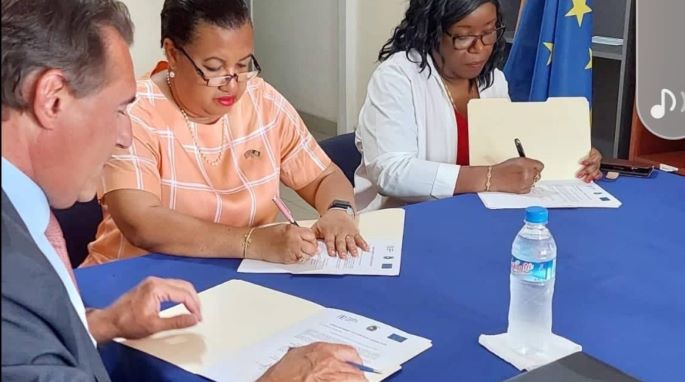SOURCE: Daily Observer newspaper
PHOTO: (From right) Deputy Minister for Budget at the Ministry of Finance and Development Planning Tanneh G. Brunson and Agriculture Minister Jeanine M. Cooper signed on behalf of the Liberian government and Head of Division, Country Relations and Public Sector Sub-Saharan Africa of European Investment Bank, Diederick Zambon and European Union Delegation to Liberia, head Lawrence DELAHOUSSE both signed on behalf of the EU.
The Liberian government and European Investment Bank (EIB) have signed a US$4 million Cooperation Agreement for technical assistance services to develop Liberia’s rice value chain.
The agreement currently focuses on the preparation of detailed feasibility studies to assess the potential and challenges of the rice value chain in Liberia in order to design and structure an investment program to be financed potentially by next year.
The rice value chain program aims to boost rice production in the country by reducing Liberia’s dependency on rice imports to improve food and nutrition security as well as create more access to entrepreneurship opportunities in the rice sub sector.
The Head of Division, Country Relations and Public Sector Sub-Saharan Africa of European Investment Bank, Diederick Zambon, said the agreement will enhance better food production for the future in the country.
“We have seen over the years a couple of crises — whether it’s the Covid-19 or the war ongoing in Ukraine — which affects food prices and energy. One of the most important things for people is to produce their own food and it’s what we are working on now,” Zambon said.
He said the agreement will work on increasing all the elements of the value chain such as access to improved seeds and warehousing, among others.
“The idea is that we want to support Liberia to become sufficient in rice production so we are very proud to support this program,” he said.
At the signing ceremony held on May 27, at the EU’s office in Monrovia, Deputy Minister for Budget at the Ministry of Finance and Development Planning Tanneh G. Brunson, and Agriculture Minister Jeanine M. Cooper signed on behalf of the Liberian government while the Head of Division, Country Relations and Public Sector Sub-Saharan Africa of European Investment Bank, Diederick Zambon and head of the European Union Delegation to Liberia, Lawrence DELAHOUSSE, both signed on behalf of the EU.
The program, according to Zambon shall support the entire rice value chain ensuring the provision of inputs, building irrigation structures, upgrading food laboratories, improving warehousing, and making provisions for logistics and among others.
The technical assistance services are financed by a grant from the European Development Fund under the Africa Investment Platform.
Also, the Head of European Union Delegation to Liberia, Laurent Delahousse said the war in Ukraine is having consequences on food commodities all over the world.
“We at the European Union believe that there’s a necessity to support local rice production so that Liberia can depend less on imports and produce more locally,” Ambassador DELAHOUSSE said.
According to him, the signing of the US$4 million Cooperation Agreement is one of the approaches by the EU to assist Liberia.
Agriculture, Jeanine M. Cooper lauded the Ministry of Finance and Development Planning for initiating the program and EIB for the support to the country’s agriculture, particularly the rice value chain.
Minister Cooper said if Liberia will boost the production of rice, focus must be placed on empowering the private sector.
“The empowerment of the private sector is something that the government is keenly looking into to ensure that the rice sector is developed.
“We all know that we are producing rice in Liberia but not consuming more of the rice produced.
According to Minister Cooper, Liberia is consuming 99 percent imported rice mainly in its capital and surrounding areas while 60 to 70 percent of imported rice is being consumed in the rural parts of the country.
She said the country continues to be imports dependent, despite having the potential to feed itself.
“We need to take the needed steps to feed ourselves and stop the dependency on other countries,” the minister stated.
The Deputy Minister for Budget Development at the Ministry of Finance and Development Planning, Tanneh G. Brunson, expressed gratitude to the EIB and European Union for affording Liberia the opportunity to develop its rice value chain.
“Rice is our staple and we don’t produce it. This provides the platform for us. How can Liberia sustain development and not be able to produce its own food,” Minister Brunson said.
The EIB is the long-term lending institution of the European Union owned by its 27 member states. As the world’s largest international public bank, it makes long-term finances available for sound investment in order to contribute towards EU policy goals.
The Bank has financed transformational public and private investments across Africa, since 1965.
It has been active in Liberia since 1978. The Bank has financed in particular the Mount Coffee hydro power plant rehabilitation and is currently financing the rehabilitation of the Sanniquellie to Loguato road project.

